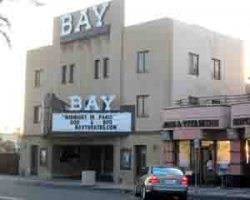On Wednesday, Sept. 7, the Seal Beach Planning Commission voted unanimously to have staff contact the owner of the Bay Theatre to let the owner know that city officials would like to preserve the last movie house in town.
The decision followed a Planning Commission discussion of the options for preserving the theater as well as the history of the Bay Theatre in Seal Beach. The discussion was held because in April, the City Council directed staff bring the preservation of the Bay Theatre to the attention of the Planning Commission
According to the Sept. 7 staff report by Senior Planner Jerry Olivera, the Zoning Code allows the commission to issue conditional use permits for preserving and rebuilding non-conforming buildings that are “locally recognized historic buildings or structures” without conforming to the code.
“It is not compulsory and does not guarantee that a building or structure will be preserved,” Olivera wrote.
According to the report, the “recognized historic buildings” section of the code requires the consent of the property owner.
In fact, every option named in the staff report requires the consent of the property owner.
There were four other options in the Olivera report:
• The Mills Act Program is a California law that allows cities to make contracts with owners of historic properties for 10 years.
Assistant City Attorney Steven Flower said Mills Act contracts automatically extend every year.
To get out of them, one of the parties to the contract would have to give 10 years notice. District 3 Commissioner Robert Goldberg said a Mills Contract would allow a property owner to save 40-60 percent in property tax.
Flower said if the property owner did not keep their end of the Mills contract to keep up the historic property, the city could sue the owner or cancel the contract. Flower said a canceled Mills contract could cost a property owner 12.5 percent of the assessed value of the property.
• A Preservation Easement “is considered a partial interest” in the property, according to the Olivera report.
The easement would have the owner transfer specific rights to a non-profit organization or a government agency. “An easement is a relatively flexible tool,” Olivera wrote.
“It can be crafted to meet the specific characteristics of the property, the interests of the easement-holding organization and the property owner’s interest in having a property that will continue to have a viable productive use,” he wrote.
The Olivera report said some easements prohibit additions while others allow additions if they are compatible with the character of the building.
Goldberg said a preservation easement is forever.
However, Flower said there was no established mechanism for getting a preservation easement.
A Historic Preservation Overlay Zone defines an area or an individual property. An overlay zone would give Seal Beach access to state and federal funding. The Olivera report said the process is potentially lengthy. Flower said he would not recommend applying legislation to one property.
• A California “Point of Historic Interest” designation would require a California Environmental Quality Act review if the property in question is threatened by a project.
One of the requirements of a Point of Historic Interest designation is that the building is the first, last, only or most significant of it’s kind in the city, according to the staff report..
District 1 Commissioner David Everson asked if the historic status of a building could impact a neighbor’s property.
Flower said if a project requires Environmental Quality Act review, the city would have to consider the impact on a neighbor’s property.
The Olivera report said staff considered the Point of Historic Interest designation to be the best one for the Bay Theatre.
Everson said the point of interest option gave the city the most flexibility. He proposed directing staff to pursue that option.
Flower said the point of interest option required owner consent.
District 5 Commissioner Sandra Massa-Lavitt asked if there had ever been an inventory of historic buildings on Main Street or in Old Town?
Olivera said no.
Commissioner Goldberg reviewed the history of the Bay Theatre and Seal Beach’s historic preservation efforts. He said that in 1991, the City Council considered adopting a list of structures for historic preservation. However, the item never came back to the council. The proposed list included 21 buildings—none of them the Bay Theatre. According to Goldberg:
In 2000, the City Council adopted a policy statement on historic structures that established a list of buildings that qualified for historic preservation conditional use permits. Two buildings were on that list, according to Goldberg. They were the Proctor House at 227 10th St. and the Krenwinkel House at 112 Central Ave.
In 2005, planners discussed promoting city-wide preservation of historic buildings. On April 6, 2005, planners directed staff to bring the issue to the City Council for direction. The council asked staff for more information on April 25, 2005. The item never came back to the council.
In August 2010, the City Council discussed preservation options for the Bay.
Goldberg said the first step would be to contact the property owner.
Massa-Lavitt said the commission should see how the property owner reacts before proceeding.











